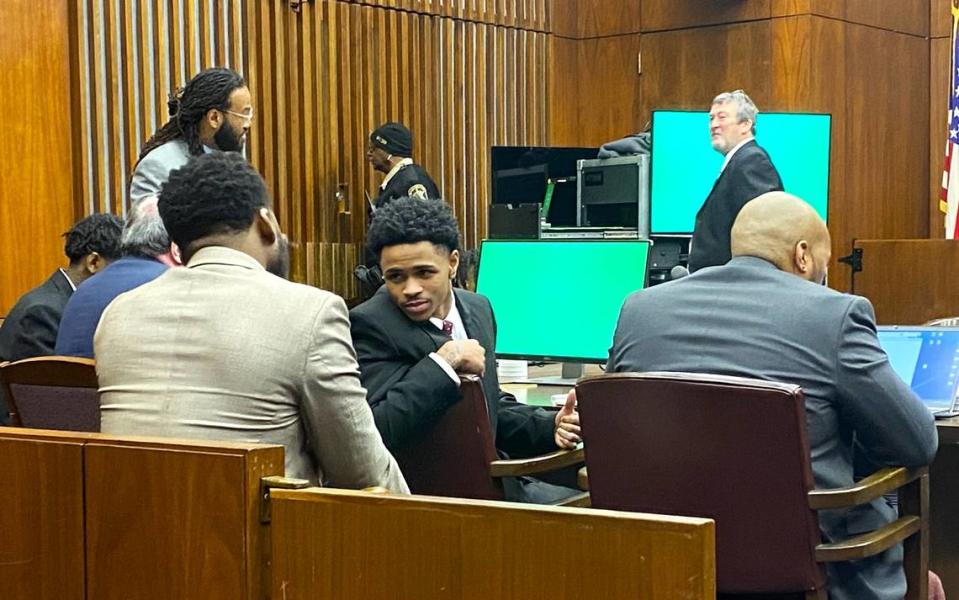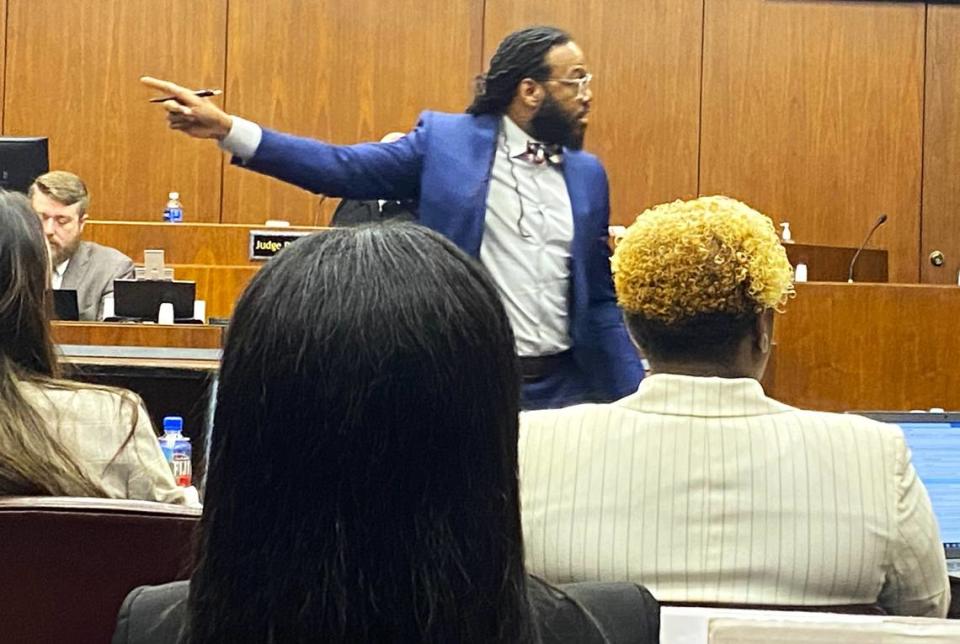Trial witnesses say no one reported man shot at alleged ‘Insane Crips’ Columbus party
No one called police to report that Marcel Samedi lay dead on the ground in the rain and dark outside Columbus’ Wilson Homes apartments.
The call Columbus police got at 9:47 p.m., June 5, 2021, did not report that anyone had been shot. A woman who was living in Wilson’s 108 building called to say only that she had heard gunshots outside.
The shots she heard were not just outside. Several bullets had penetrated her windows or doors, puncturing inside walls. The responding officer, Jerry Brown, found four bullet holes in her back door and two more in the door frame,
In the pelting rain, Brown started walking around the building, noting bullet casings on the ground before shining his flashlight on a body lying beside a wall.
“I got one down,” he told a dispatcher on his radio, at 10:02 p.m. “I got six shots here. I got one down.”
It would take authorities a week to identify the South Carolina man, who had not been reported missing.
That was the first mystery investigators faced in the murder case now at trial in Muscogee Superior Court, where three men alleged to be in the “Insane Crips” street gang are accused in Samedi’s fatal shooting.
“It took six days to identify him,” lead prosecutor Thomas Kegley said as the trial began last week. “Law enforcement initially didn’t know who this person was.”
Police thought Samedi had no identification on him, although he did, hidden deep in his shorts.
Samedi’s mother testified last week that she didn’t know her son had traveled to Columbus from his home in Rock Hill, S.C., and did not learn of his trip until days later. She called Columbus police on June 11, 2021, to say he was missing.
She told police Sgt. Donna Baker, who was assigned to the homicide case, that her son had tattoos and a chipped tooth. Her description matched the body, but it was not enough to be considered confirmation, Baker testified Monday.
The mother last had communicated with her son the prior June 5, Baker said, but the 21-year-old was known to be secretive. “She was giving him time to make contact with her,” Baker said.
Because Samedi was not from Georgia, his fingerprints were not on file here for law enforcement to match through available state records, police said.
The investigator initially charged with identifying Samedi was Detective Robert Nicholas. He said officers found Samedi face down in the grass, wearing black pants and a black hoodie, his arms underneath him, a “soft-shell” gun holster and a pistol in his pants.
Nicholas noticed blood on Samedi’s face, evidence of a 9-millimeter bullet wound to his left cranium. Bullet casings littered the ground around him.
After days of questioning people who knew Samedi, authorities finally identified him not just from the mother’s description, but from the medical examiner conducting the autopsy.
Stripping the clothes off Samedi’s body, the pathologist found a identification card, stuffed into a second pair of shorts he had been wearing.
Not wanting to taint any evidence of the homicide, police had not dug that far into his clothing.

Trial in second week
Samedi’s death kicked off an extensive investigation into his alleged gang affiliation with the “Insane Crips,” a subset of the national Crips gang, Kegley said.
He told jurors Samedi, who had come here for a mass gathering of gang members, was killed during a “beef” or dispute between senior gangsters, one a man named Makenzie Pearce, who faces no charges in the case, and another named Michael Douglas Brown Sr., 48, who was charged with gang violations in Samedi’s shooting.
Brown has yet to be captured, said Kegley, who has not specified how a dispute between Pearce and Brown led to Samedi’s shooting. Pearce testified last week, but divulged no details clarifying his connections to Brown or to Samedi.
Prosecutors on Monday were showing jurors surveillance video from Wilson Homes, the day of the shooting, showing the suspects among the people gathered there.
The three defendants on trial are Corey Troupe Jr., 26; Davion C. Dupas, 22; and Jahiem Rashard Davis, 21.
Another suspect, Elysia Cooley, 19, who was only 16 years old when Samedi was killed, is to testify for the prosecution. Her case has been severed from the others and will be decided separately.
Troupe, also known as “Lil Pop,” and Dupas, known as “Yungdemon Dee,” both face six counts of violating the Street Gang Terrorism and Prevention Act, two counts of felony murder and one count each of aggravated assault, using a firearm to commit a felony, and first-degree criminal damage to property.
Jahiem Davis, also known as “Zhg Jah,” faces eight counts of violating the Street Gang Terrorism and Prevention Act, three counts of felony murder and one count each of aggravated assault, using a firearm to commit a felony, first-degree criminal damage to property, and being a convicted felon with a firearm.
Each defendant could be sentenced to life in prison if convicted.


